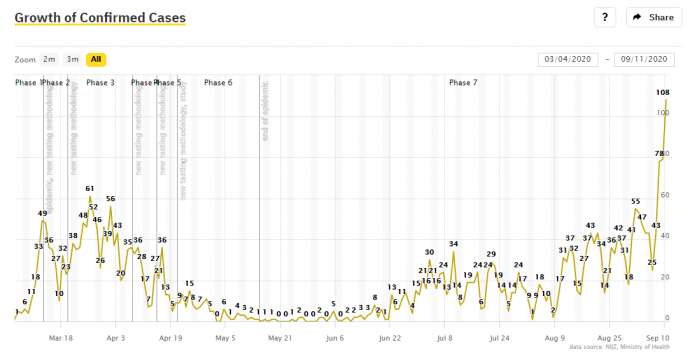STA, 11 September - Slovenia saw 108 new coronavirus cases on Thursday, a record-high daily tally and the first time the total exceeded 100, after conducting 2,758 tests, the highest daily number so far as well, show fresh official data. No new Covid-19-related fatalities were reported.
There are currently 701 active cases in the country, according to national tracker site Covid-19.sledilnik.
A total of 27 persons are in hospital currently, including five in intensive care.
Among the latest cases, there were also six detected in health workers, six in residents of care homes and one in care home staff, show the national tracker's data.
A total of 2,662 persons have recovered from Covid-19 so far.
Mario Fafangel, the chief epidemiologist at the National Institute of Public Health (NIJZ), said at today's government coronavirus briefing that Slovenia's current 14-day incidence was 34 per 100,000 residents.
He pointed out that the situation was similar to April, however there was no lockdown, instead it was key to adapt to the new normal, heed precautionary measures and keep boosting the testing capacity.
Commenting on the cutting short of the mandatory quarantine from 14 days to 10 days as of Sunday, he said the measure would be shortened in all cases and not merely for arrivals from Covid-19 risky countries, as was the government's decision on Thursday.
Fafangel highlighted compulsory quarantine was a uniform measure regardless of whether the quarantine order was issued by the border police or the NIJZ, so those found to have been in close contact with an infected person would be also recommended a 10-day mandatory self-isolation starting from Sunday.
The epidemiologist pointed out that 7% showed symptoms after 10 days in self-isolation, which is fewer than 10 cases per month and fewer than 1 per day.
Shorter mandatory quarantine poses a somewhat greater risk, but the public health is still protected, he said. The virus is here to stay for now, at least until a safe and effective vaccine, and it is important to slow it down using sustainable measures, Fafangel pointed out.
Coronavirus is mostly spreading within the country, only 35 of the 307 cases confirmed last week were imported, and the sources were often unknown, he added.
The latest cases were mainly confirmed in generations aged between 25 and 44 years, however the infections have been spreading to care homes as well, he warned, urging special efforts to protect the most vulnerable groups, including nursing home residents.
Fafangel said the situation was still more or less under control though since approximately 4% of all tests came back positive. "That is good because it means that there is a lot of testing and that there is no iceberg [of undetected infections] behind us."
At the start of the epidemic, the average time between the first symptoms and the test was four days, but the period has been reduced to three days.
If it is further cut to two days or even one day, epidemiologists could trace 60% of all the contacts of the infected person, thus maintaining the reproduction number at 1 and containing the epidemic, he said.
The NIJZ, which can currently trace contacts of up to 100 infected persons in a day, has boosted its staff capacities, including with the help of 15 medical students, who deal with half of the cases and are constantly supervised by an epidemiologist. The institute plans to further step up efforts to ensure enough testing and tracing, said Fafangel.
The latest infections bring Slovenia's overall tally of cases to 3,498, while the death toll remains at 135.
The latest statistics on coronavirus and Slovenia, and the latest police news on red, green and yellow list countries. All our stories on coronavirus and Slovenia. Can I transit Slovenia? Find out from the police...






